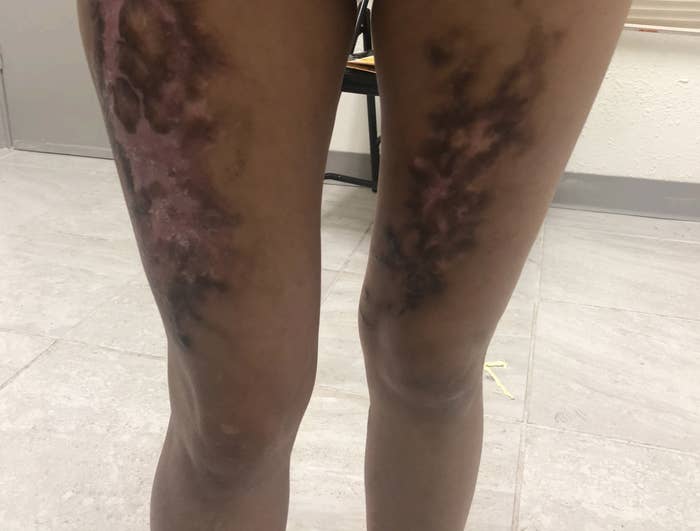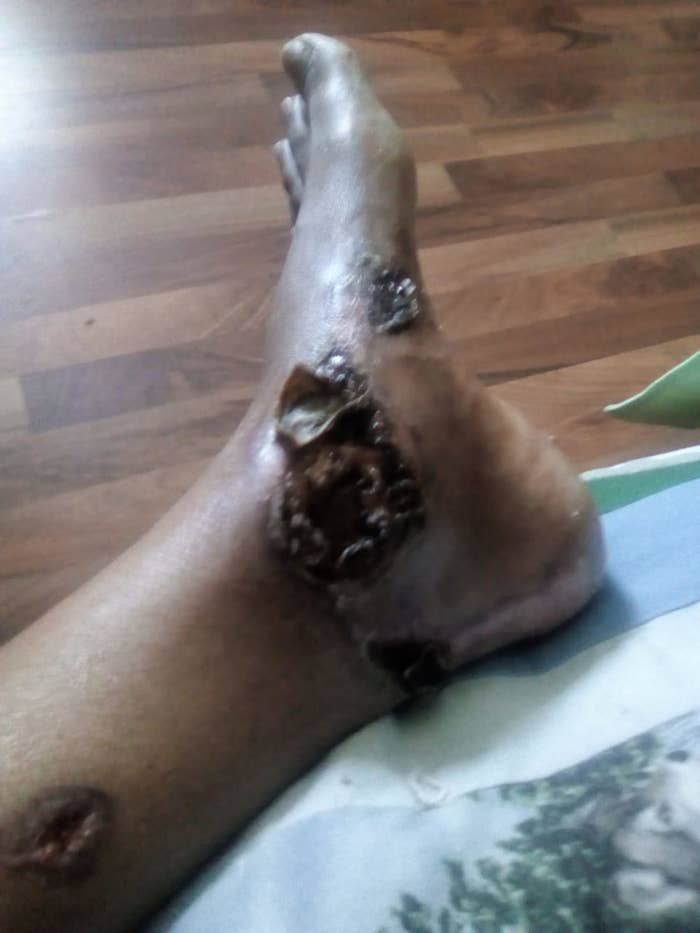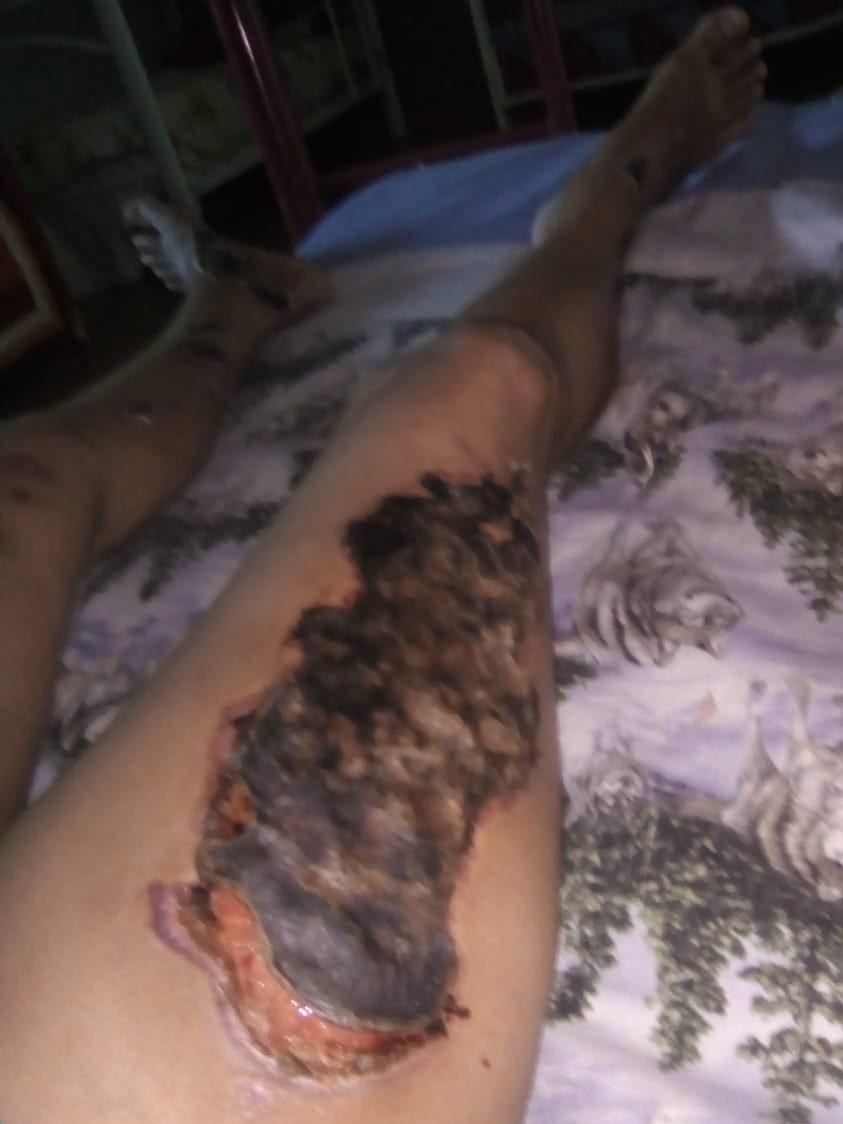
By the time Elizabeth asked US border agents for asylum, she had been kidnapped, sexually assaulted in front of her daughter, and had her legs burned with acid.
Finally, the 41-year-old asylum-seeker thought she would be safe and out of reach from the men in the Mexican border city of Ciudad Juárez who had tortured her for 12 days in an empty home that smelled like death. Instead, she was sent right back to the same city to wait until her US Immigration Court case was completed under a Trump administration policy, a process that could take months and require her to stay in one of the most violent cities in the world.
"I was scared because they were sending me back to the place where all of these terrible things happened to me," Elizabeth, who agreed to only use her middle name, told BuzzFeed News in Spanish. "People in Washington need to realize that despite them saying Mexico is a safe place for immigrants and even a place we could ask for asylum, they are putting us in danger of being tortured, kidnapped, or worse."
Attorneys representing Elizabeth, who is from Guatemala, asked that BuzzFeed News not use her full name out of fear of retaliation for speaking out against US immigration policies.
Since its implementation in January 2019, the Migrant Protection Protocols (MPP) has forced nearly 60,000 immigrants and asylum-seekers to wait in Mexico for months while their cases are adjudicated by a US immigration judge. A Human Rights First database has tracked more than 1,000 public reports of rape, torture, kidnapping, and other violence against people sent back to some of the most dangerous cities in the Western Hemisphere.
When the policy was rolled out, the Department of Homeland Security said immigrants would not be involuntarily returned to Mexico if they would more likely than not be persecuted on account of race, religion, nationality, membership in a particular social group, or political opinion. Doing so would violate the non-refoulement principle, the practice of not forcing asylum-seekers to return to a place where they may be persecuted.
Elizabeth told Customs and Border Protection officers about being kidnapped and attacked. She begged them not to send her back because she was afraid she would once again be targeted for being an immigrant and a woman. A CBP officer told her she would be safe at a shelter.
She tried a second time in January by going through a non-refoulement interview with a US asylum officer. She was told she didn't pass the interview and was sent back to Mexico. Her case is emblematic of the obstacles other immigrants in MPP who have been attacked in Mexico face when they try to convince an asylum officer to let them stay in the US instead.
It is rare that an immigrant passes these interviews. A government analysis from last year of over 7,400 screenings to assess fear of returning to Mexico found that only 13% passed their interviews.
Nicolas Palazzo, as attorney with Las Americas Immigrant Advocacy Center in El Paso, Texas, said US asylum officers who conduct interviews to determine whether people in MPP would more likely than not be persecuted if they are sent to Mexico are incorrectly turning people away.
"This is a very clear-cut case because she was targeted and burned for being a woman and for being a migrant," Palazzo said. "This is not a unique story. This is happening to hundreds of individuals who are not necessarily being chemically burned, but are facing equally horrific acts of violence, and the United States is really failing to meet its obligations to not return someone back to a country where they will more likely than not be tortured."
DHS has also issued guidance that says immigrants with known physical and mental health issues should not be sent back to Mexico under MPP. However, CBP still sends back adults and children with health issues.
Elizabeth wasn't able to get the medical care she needed in Ciudad Juárez, and a doctor told her that if she remained in Mexico, she'd be at risk of infection and scarring, which could affect her ability to walk.
US Citizenship and Immigration Services, which employs asylum officers who oversee the non-refoulement interviews, did not respond to a request for comment. A CBP official said the agency determines whether an immigrant is amenable for MPP on a case-by-case basis and consults with medical professionals.
"If specific medical issues or situations guaranteeing exemptions were to be standardized and made public, they would be exploited by human smugglers," a CBP official said in a statement.
Elizabeth left her home in Guatemala after being brutally beaten by the father of her daughter. She went to the police who refused to help her despite filing a complaint against him. The beatings in front of her daughter continued. Fearing that one day soon he'd kill her, Elizabeth left with her daughter.
"There's a reason why there are so many femicides," Elizabeth said.
The pair arrived near Ciudad Juárez in late July. She got off a bus she took with her daughter that was supposed to take them to Ciudad Juárez and got into what she believed was an Uber. She asked the driver to take her to the bridge that connects the city to El Paso. But as the city lights started to fade and the streets turned to desert and cliffs, Elizabeth realized the driver was taking her away from the city.
For about 12 days she was kept inside a dirty home, occasionally fed old food, and assaulted. Different men touched her genital area and licked her breasts in front of her daughter, according to documents provided by her attorneys. She wasn't raped, but later had brownish discharge from her vagina she believes was the result of the men hurting her with an object or fingers.
Her attorneys said they believe the men were in the cartel, but don't know for sure. They threatened to rape her and her daughter if she didn't provide them with a number to call family for ransom. After days of holding her for ransom that her family couldn't pay, the men threw chemical acid on her legs that resulted in second-degree burns. Despite closing her eyes and covering her ears, her then-10-year-old daughter could hear her mother's screams, later telling Elizabeth she would never forget the sound of them.
At one point their kidnappers went outside and her daughter realized they left the door open. Elizabeth was too weak and in too much pain from the acid burns, but her daughter persisted.
"'I don't want them to kill us, torture us, or do something worse,'" Elizabeth recalled her daughter saying. "'I can't take this anymore, I feel like I'm going to die from sadness.'"
The pair ran from the house and were eventually chased by their kidnappers, armed with large black weapons, Elizabeth said. She fainted from the pain and heat, so her daughter ran ahead and flagged down police officers who called for help. A helicopter arrived shortly after to pick up Elizabeth.
Elizabeth woke up in a hospital and was discharged after seven days despite her left ankle still bleeding and with the bone exposed. Elizabeth said the hospital was overcrowded and didn't have enough space, but believes she was discharged quickly because she was an immigrant and not a priority for the hospital's staff.
She was taken to a shelter that was later closed due to bad conditions. At a second shelter, the director and staff helped cure her ankle — which smelled and cause her to fear she would get gangrene — with medication and topical creams because Elizabeth was too scared to venture outside.
In November, Elizabeth had recovered enough to walk, so she went with her daughter to the Arizona border and presented herself to CBP officers to request asylum. She told them about her attack and was taken to a hospital in Tucson to be medically screened. The doctor prescribed her medication to avoid infection. Then CBP sent her back to Ciudad Juárez.
On Jan. 31, Palazzo and other attorneys walked with her to a border crossing and asked that she be allowed to fight her case in the US. She was interviewed on the phone by the asylum officer who later said she failed.
While Elizabeth was in Ciudad Juárez, the shelter operators asked her if she could watch the door while they ran an errand. A shootout occurred shortly after between criminals and police near the shelter. Men who were running from the police ran up to the shelter's doors and told Elizabeth to let them in. She faced them and refused, but they threatened to come back for revenge before running off.
Last week, a day before Elizabeth was due at a court hearing in El Paso, she was in the streets of Ciudad Juárez when one of her kidnappers approached her and recognized her. Filled with dread, Elizabeth and her daughter quickly made their way to the shelter to hide. Her fear then was that the men would come looking for her there.
The next day, on Friday, she went to her immigration court hearing in El Paso. She joined other immigrants in MPP who present themselves at the border in the predawn hours of the day to be transported to immigration court. Her plan was to ask for another non-refoulement interview, but that same morning, a federal appeals court blocked the Trump administration policy.
For the entire day, attorneys, immigrants, and advocates tried to understand what the 9th Circuit Court of Appeals’ order affirming a 2019 preliminary injunction meant for people stuck in Mexico, but also what would happen to those who had court hearings in the US that day, like Elizabeth. Sending them back would surely violate the judges’ order, some immigration attorneys said.
By Friday night, the 9th Circuit stayed its initial order blocking the Trump administration from enforcing MPP and the policy was allowed to continue. Still, Elizabeth and her daughter remained in CBP custody, and attorneys weren't sure authorities were going to release her into the US.
She was interviewed three times about her fears of being sent back to Mexico. Her daughter told a US asylum officer about the nightmares she has, how she can't sleep, and that she had trouble eating. Eventually, Elizabeth was told she passed her interview, was released Monday with an ankle monitor, and sent to reunite with family in Kansas.
Elizabeth was worried about the costs of continuing to receive medical care in the US for her acid burns, but she is determined to start a new chapter in her life.
"I've suffered a lot," she said, "but for the first time in a long time, I feel safe."
UPDATE
This post was updated to include the more than 1,000 public reports of rape, torture, kidnapping, and other violence against immigrants sent back to Mexico.


